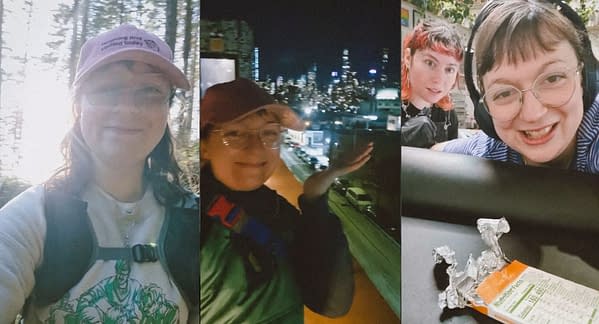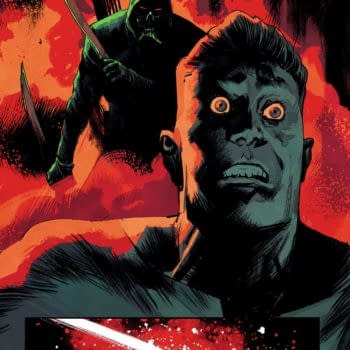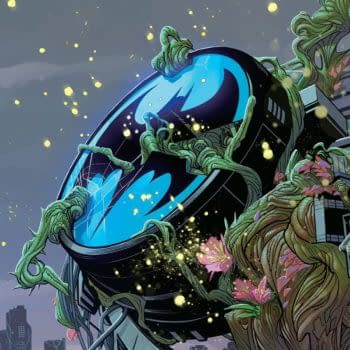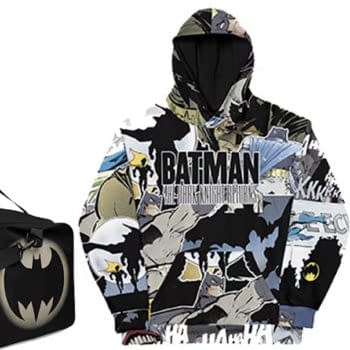Posted in: Comics, Current News | Tagged: Becky Burke, R.E. Burke
British Comic Creator R.E. Burke Banned From Visiting USA For 10 Years
British comic book creator R.E. Burke, has been banned from visiting the USA for ten years... I doubt that will be a problem.
Article Summary
- British comic creator R.E. Burke detained in harsh U.S. immigration conditions for 19 days.
- Burke's experience led to a decade-long ban from the U.S. and changed UK travel advice.
- Her detention included unjust visa allegations and heartwarming support from fellow inmates.
- Burke channels her ordeal into a new comic, spotlighting untold stories of detained women.
Jenny Kleeman is a friend and neighbour of comic book creator R.E. Burke, Becky Burke or Rebecca Burke. The British comic creator detained by the US customs in harsh conditions for 19 days, whose experience rewrote the UK Government's advice to tourists going to the USA, which has also ensured there are fewer UK guests at US comic conventions this year. And Jenny interviewed her, and wrote about her for the Guardian newspaper yesterday. We've all read or seen her story by now, but Becky has shared more details from her experience, now one of many.

"She wasn't thinking about the dismal state of US-Canada relations when she handed her passport to the Canadian border official… Becky had always travelled with a tourist visa in the past – including to the US in 2022 – without any problems. She checked that work visas were only required for paid work in Canada. She had had months to plan her trip, and would have applied for a work visa if it was necessary, she says. But the Canadian officials told Becky they'd determined she needed a work visa. She could apply for one from the US and come back, they said. Two officers escorted her to the American side of the border. They talked to the US officials. Becky doesn't know what was said."
She waited for six hours, watching others refused entry to the US and sent back to Canada.
"Then she was called into an interrogation room, and questioned about what she had been doing during her seven weeks in the US. Had she been paid? Was there a contract? Would she have lost her accommodation if she could no longer provide services? Becky answered no to everything. She was a tourist, she said."
An hour later, Becky was handed a transcript of her interview to sign. She was alone, with no legal advice.
"It was really long, loads of pages." As she flicked through it, she saw the officer had summarised everything she told him about what she had been doing in the US as just "work in exchange for accommodation". "I remember thinking, I should ask him to edit that." But the official was impatient and irritable, she says, and she was exhausted and dizzy – she hadn't eaten all day. "I just thought, if I sign this, I'll be free. And I didn't want to stay there any longer." So she signed. Then she was told she had violated her tourist visa by working in the US. They took her fingerprints, seized her phone and bags, cut the laces off her trainers, frisked her, and put her in a cell. "I heard the door lock, and I instantly threw up."
She was told she would only be there for one or two days before being flown home. This did not happen.
"Becky was shackled and put into the back of a van. "I had no idea where we were going. It was just bumping around in darkness with handcuffs on." At 2.30am, she arrived at the Ice facility in Tacoma, Washington. She was made to change into standard-issue underwear, a yellow top and trousers. Officers took away all her personal belongings, measured her height and weight, made her pose for a mugshot, and assigned her an "A" number (short for "alien"). Whenever she asked the people processing her arrival how long she would be detained for, they told her they couldn't help: they worked for GEO, the private company contracted to run the facility, and not Ice, the government body that would decide her fate."
The bureaucracy seems to be the cruellest thing about the whole experience.
"At 5.30am, she was taken to the dorm that she was to share with 103 other women: a massive room filled with metal tables, benches and bunk beds, some cells around the perimeter, and a row of payphones, "like a hospital mixed with a canteen". It was bathed in bright halogen light that Becky would come to learn would always be on, albeit slightly dimmed between 11.30pm and 5.30am. Becky's bunk was on a mezzanine level."
After making a phone call, she tried to get her family to put money in her inmate account so she could buy necessities and tried to communicate with ICE.
"I sent a message to Ice straight away saying: 'I am a tourist. I was just backpacking. I have not outstayed my visa. I've only been in America one month and two weeks. I don't know why I'm here. I want to go home. Please can you help?'" She frantically refreshed the app to see if her account had been credited. (It took longer than expected, because funds can only be transferred into accounts for "illegal aliens" from within the US. Becky's father, Paul, discovered he could only do it through an American friend.)"
But it was those around who had ever less than her, but wanted to share, who may be the true heroes of this story.
"A woman called Lucy offered to let Becky use her phone credit if money hadn't appeared in the account within a few hours. Rosa, a Mexican woman who spoke barely any English and had already been detained for 11 months, offered Becky a Pot Noodle she had been able to buy from the commissary, the shop where they could purchase luxuries. At 8am, Becky finally curled up in her bed to sleep, with Rosa praying in Spanish in the bunk below."
And she began to record their experiences the way she knew how.
"On her first day in the facility, Becky asked for a scrap of paper and a pen, and began to draw the inmates on the table next to her. She was immediately inundated with portrait requests. A Mexican woman called Lopez, who had a photo of her children stored on one of the iPads, told Becky she would buy her some paper and colouring pencils from the commissary if Becky drew her kids. She soon became the dorm's unofficial artist-in-residence, with women huddling around the dirty mirrors to make themselves look presentable before they sat for her. They would decorate their cells with Becky's drawings, or send them to their families"
And they all had their stories.
QLewelyn joined the dorm a few days after Becky. She had just returned from visiting her family in the Philippines; she had been living in the US since 1976, working as a lab technician at the University of Washington hospital's cancer centre. "She'd had a visa issue that had been resolved many years ago, but now it was flagging on the system again." Kseniia, a Russian woman who had been working for two years in a California nail salon, had permission to work in the US but was handcuffed while waiting for her husband to come out of an Ice interview. "She was so confused. She kept saying to me, 'I've got a work permit.'"…Bana, from Romania, was on holiday in Canada and visited Peace Arch park, on the international boundary between the US and Canada. She told Becky she had been taking selfies with her husband when a US border official told her they had strayed into American territory without the right visa and took her into custody."
And the bureaucracy continued to bite.
"She found out the Ice officer assigned to her case had gone on annual leave. The following Monday, Paul contacted the Foreign Office in London, and the British consulate in San Francisco. "They were doing the diplomatic bit," he tells me. "But, after seven days, I could see it wasn't really working. My perception is the British consulate couldn't get Ice people to respond to them. There was no end in sight."
It was at this point that her father Paul Burke posted about his daughter's experience on Facebook. Bleeding Cool and then many other media organisations picked up the story.
"Hours after her story broke, she was visited by an Ice officer who told her she was now "at the top of the pile" to be processed. Four days later, on a Thursday, another Ice officer came to the facility to tell Becky her flight had been booked for the following Monday…. At one point, her face flashed up on one of the three TV screens they had in her dorm. "Everyone clapped. After that, a few people came up to me and said, 'Can you put me on TV, too?'"
Nineteen days after being in detention, she was leaving.
"She wasn't allowed to tell her family she was on her way home, but one of the women offered to ring her parents to notify them. Becky was shackled at the ankles, wrists and waist, and then made to shuffle out into a van… While every item in her bag was swabbed and dismantled, she was subjected to a full body search. "I was in this very loud, weird, industrial space with pipes and conveyor belts and lights and sirens, being told to open my legs. I was silently crying, watching all my stuff being torn apart as someone else was searching every crevice of me."
Now, still suffering from the impact the experience had on her, she is creating a new comic book telling not just her story but of the women she shared it with, many of who are still detained. The deportation paper Becky signed bans her from the US for the next 10 years, she may have to send someone else to pick up the Eisner.











